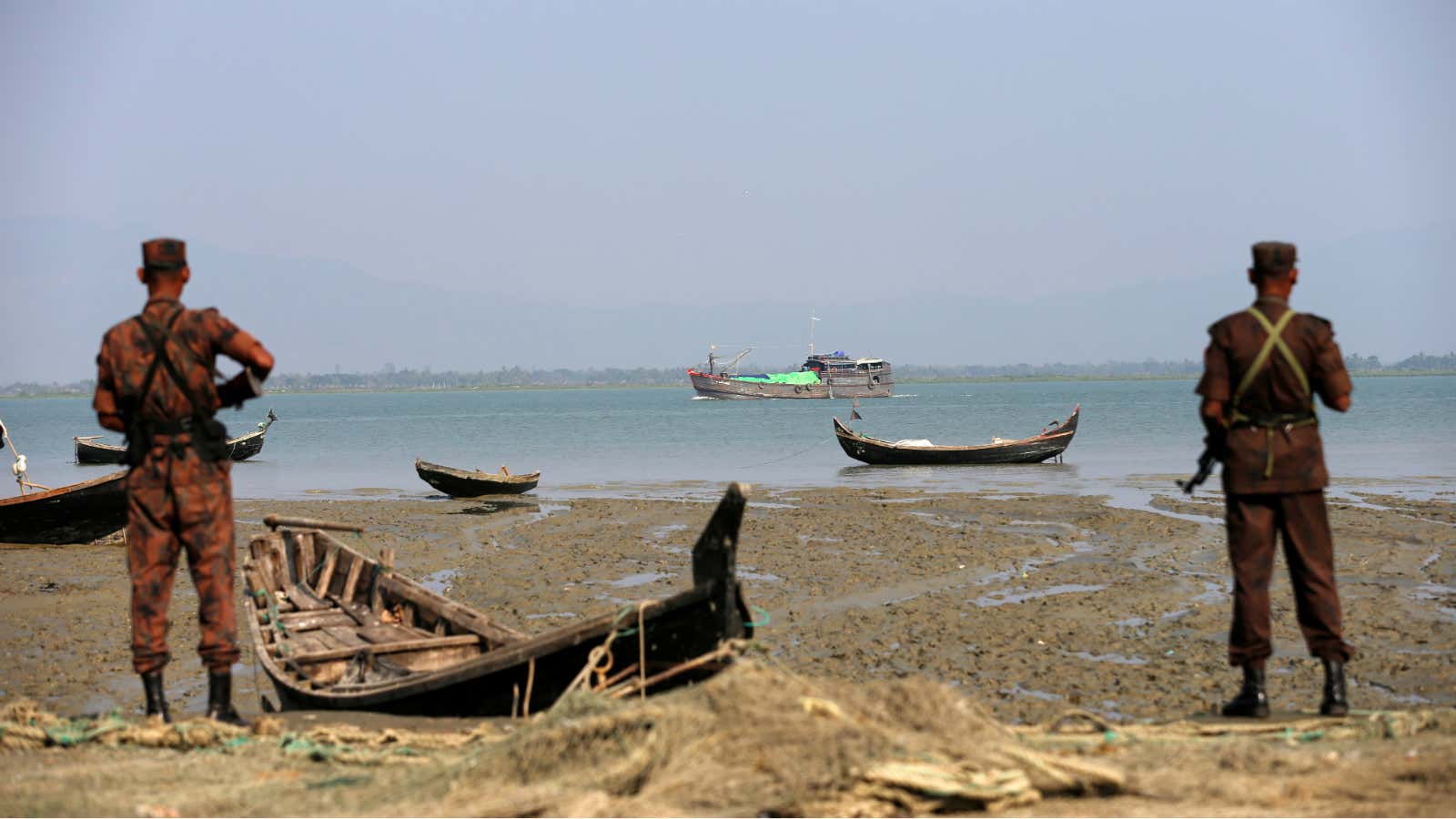In case the long list of terror organisations already menacing India wasn’t enough, there’s a new threat brewing beyond the country’s eastern borders—in Myanmar.
The recent involvement of foreign jihadi groups in the conflict between Myanmar’s majority Buddhist population and the embattled Rohingya minority could mean further instability on India’s eastern and northeastern flanks.
Violence has flared up in Myanmar’s restive Rakhine province, bordering Bangladesh, after militants attacked border guards in October, subsequently drawing an allegedly brutal reprisal from government forces. The primary terror group involved in Rakhine appears to be the Harakah al-Yaqin (Movement of Certainty), which the Myanmar government refers to as the Aqa Mul Mujahidin.
The organisation is led by a committee of around 20 senior leaders based in Saudi Arabia, according to a report released earlier this month (pdf) by International Crisis Group (ICG). “All are Rohingya émigrés or have Rohingya heritage. They are well connected in Bangladesh, Pakistan, and possibly India,” the Brussels-based think-tank reported. “Some or all have visited Bangladesh and northern Rakhine state at different times in the last two years.”
The Harakah al-Yaqin itself may have been born out of the jockeying for power between the so-called Islamic State (ISIL/ISIS) and Al-Qaeda in the Indian subcontinent, the regional branch of the terror group, according to Jasminder Singh and Muhammad Haziq Jani of Singapore’s S Rajaratnam School of International Studies. In a commentary released in October, Singh and Jani wrote:
This group of militants, now identified as belonging to Harakah al-Yaqin, wants foreign-based Rohingya and jihadists to join them in northern Arakan to fight Myanmar forces who were looking for them at that moment. They requested medicine and for foreign-based Rohingya to relinquish their love for the world and their fear of death and to sacrifice their lives. They also asked for religious leaders to issue fatwa to legitimise their violence.
Among the prominent members of the group is one Ata Ullah (alias Ameer Abu Amar, Abu Amar Jununi). The Karachi-born son of a Muslim man from northern Rakhine state, according to ICG, Ullah grew up in Mecca and Saudi Arabia and received an Islamic education.
“He disappeared from Saudi Arabia in 2012 shortly after violence erupted in Rakhine state. Though not confirmed, there are indications he went to Pakistan and possibly elsewhere, and that he received practical training in modern guerrilla warfare,” ICG said.
“Some 20 Rohingya from Saudi Arabia (separate from the leadership committee), including Ata Ullah, are leading operations on the ground. Like him, they are thought to have experience from other conflicts, possibly Afghanistan and Pakistan,” the report added.
The Harakah al-Yaqin, according to some accounts, could also have links with the Lashkar-e-Taiba, the Pakistan-based terror group that organised the 2008 Mumbai attacks, and the Jaish-e-Mohammed, a militant organisation that operates in Jammu & Kashmir.
The rise of an Islamic terror group could gravely complicate matters for the 1.1 million Rohingyas living in Rakhine. Although a mujahidin rebellion has been simmering in the region since the 1940s, the Rohingyas had little in the way of an armed struggle by the late 1990s after the decline of the Rohingya Solidarity Organisation. But with renewed armed resistance, albeit with significant external motivation, an already bloody government crackdown could potentially become even harsher.
And for the neighbourhood, including the Southeast Asian countries, Bangladesh, and India, this could be the beginning of a new security headache.
